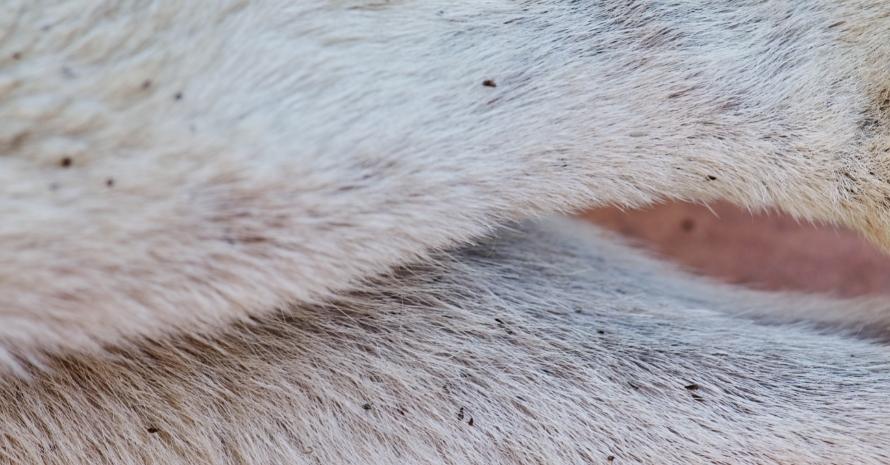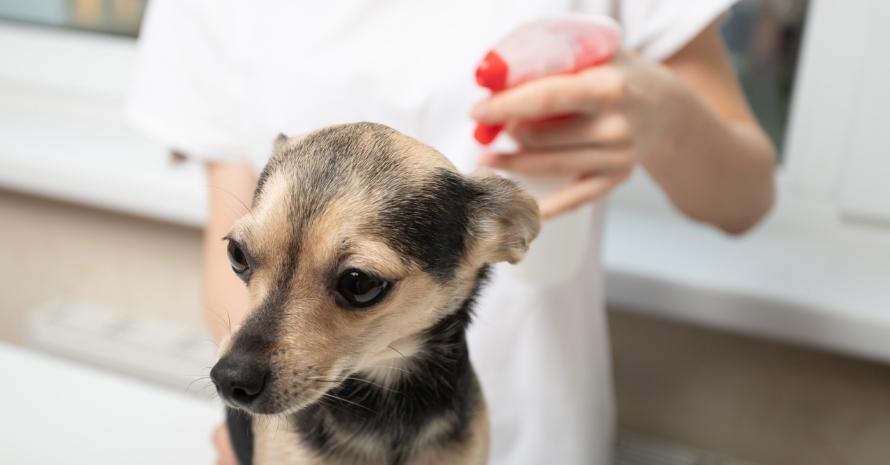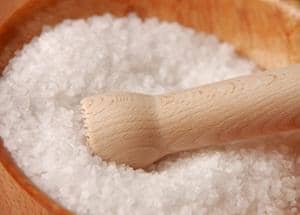Preferring natural remedies to synthetic ones makes sense: They seem to be safer, cheaper, and are usually found in any kitchen. Salt fits all these criteria, so many people try to use it for a variety of purposes, and getting rid of insects is one of them.
Does salt kill fleas? The short answer is yes, but not in the way you need. In this article, I will explain popular myths about using salt as a repellent and take a look at other, more effective ways to get rid of these parasites both indoors and outdoors.
Guide on Using Salt Against Fleas
- Add salt to the water or use sea or ocean water.
- Pour it over the area where fleas dwell. This method works only outdoors.
- Wait until the soil dries and repeat the procedure if needed. Note that you can kill not only fleas but beneficial insects and plants.
Does Salt Kill Flea Eggs or Adult Fleas?
Fleas pass four stages of their development. Every stage behaves differently and dwells in a different environment:
- Eggs resemble grains of salt; they are no bigger than 0,5 mm white and round-shaped. The first eggs are laid on a host 1-2 days after the first blood feeding. Unlike adult fleas, eggs can’t hold on to the host; they fall off in a few hours. It takes 2-3 days for an egg to hatch; then it becomes a larva;
- The larva is much more difficult to remove because it sticks to various surfaces. The same applies to the next stage, the cocoon, which gets tied to the carpet fibers;
- An adult flea’s life lasts for a week. It lays 25-30 eggs in a day, which means one adult flea can lay about 200 eggs overall.
However, not every egg survives and hatches. Some of them die because of the unfavorable conditions, and others are non-viable, so they serve as feed for the larva. Any remedy is supposed to kill eggs as they are the easiest to remove and represent about half of the whole infestation.
Salt is widely used in houses, and you can easily find a number of recipes on how to clean, keep the item fresh, or prevent pests by using salt. It is a popular means since it is safe, unlike household chemicals, and always at hand.

You can find advice on using salt for fleas among all the options, but will it work out? This method dates back to the 1900s, before the invention of modern insecticides, and was applied to outdoor areas. To get rid of fleas, you have to spray salty water or seawater on the ground. It dries the soil and makes the environment unfavorable not only for fleas but for any other insect or plant. The efficiency of treating indoor areas with salt has never been scientifically proven to remove fleas.
Is It Safe to Use Salt to Control Fleas?
Fleas can be found both at home and outdoors, and there are different ways of fighting them based on the environment. The safest option is vacuum cleaning. Let’s see all the alternatives at your disposal, with salt coming as the first one.
Salt and other natural remedies
You might want to find a natural recipe to remove fleas. Essential oils, apple vinegar, and citruses are the most common ingredients to repel fleas, even though they are unable to kill the pests at any stage. The same applies to using salt for fleas in a yard: It is safe for humans, useless for fleas, and spoils the ground.
Vacuum cleaning
Vacuum cleaners remove all the stages of fleas, their feed, and the debris they hide in:
- Eggs are the easiest to pick up, so a vacuum cleaner can collect from 30 to 90% of them;
- Larva and cocoons attach to the carpet they live on, so you can remove them by vacuuming up to 50% of larva and a little bit more than 60% of cocoons.
The main advantage of vacuuming is that it implies no insecticides are used. It is completely safe for anyone, including kids, pets, people suffering from allergies, etc. However, it can be used only indoors.
Insecticides
Another way to remove fleas is insecticides. The market offers numerous products with different working principles, which affect fleas in various ways, for example:
- deal with adult fleas, affecting the nervous system and preventing normal transmission of nerve impulses;
- provoke rapid twitching of voluntary muscles, which leads to paralysis;
- restrain ovicidal activity, which means they can kill the pests at the egg stage.
You can use insecticides both outdoors and indoors, but they are less safe than vacuuming. Single-use of pesticides can lead to such symptoms as headache, dizziness, muscular weakness, and nausea. Regular exposure can damage the liver, kidneys, endocrine, and nervous systems.
How Does Salt Kill Fleas?

All natural recipes had been in use before modern insecticides appeared. All the methods to deal with these insects are divided into two groups: chemical and mechanical. Let’s discover the difference between them.
Chemical methods
Chemical ways imply using insecticides and natural remedies. Salty water refers to the second group:
- The idea of using table salt for fleas is not new. Salty water or seawater was used outdoors to treat the ground. When the water dries, the salt, in turn, dries out the soil and makes it unsuitable for living;
- Insecticides affect fleas in different ways, mostly damaging their nervous systems. Despite the variety of recipes based on plants, essential oils, and other everyday products, they are too weak to kill any stage of fleas. Such remedies can be used only for their repelling properties.
Depending on the ingredients, insecticides can:
- directly affect the nerve endings of the insect’s olfactory organs, preventing them from choosing you as a host;
spoil the taste and smell in direct contact with the treated surface;
disguise natural odors that attract them.
Mechanical solutions
“Mechanical” refers to different methods, but most often, they imply vacuum cleaning. Depending on the surface you treat, carpet density, and suction power of the cleaner, the device can pick up from 30 to 90% of fleas at different stages. Vacuum cleaners collect eggs and adult fleas and tear larvae and cocoons off the carpet fibers. Even if the vacuum cleaner can’t tear off the larva, the vibration disturbs it and prevents it from creating a cocoon. Pupa without a cocoon is much easier to pick up. Moreover, vacuuming makes your house less suitable for fleas to live in since it removes the debris that the pests hide in and feed on.
How to Use Lime to Kill Fleas?
The original recipe is harmful to the soil, but it has logic behind it. Here is the step-by-step instruction straight from the 1900s:
- Prepare a solution by mixing salt with water or use seawater instead.
- Pour it over the yard or any outdoor area where these insects live.
- Wait until the ground dries and repeat the procedure if needed.
Over time, a lot of other recipes have been invented, but all of them lacked proof of efficiency. The effect of using salt on fleas is backed by user experience and expert observations.
FAQ About Using Salt for Eliminating Fleas

People often prefer close-to-hand remedies before trying household chemistry, so there are a lot of folk recipes involving salt, vinegar, baking soda, and any other product you can think of. Here are some popular questions concerning using salt against fleas.
How long does it take for salt to kill fleas?
Salt doesn’t kill fleas. The idea of using salty water for getting rid of fleas appeared in the early 1900s and assumed outdoor application. Since salt absorbs water, spilling salty water on the ground makes it unsuitable for pests to live there after drying.
Can I put salt on my dog to repel fleas?
The only remedy you can apply to your dog is the one a vet advised you. Salt can cause skin irritation, vomiting, diarrhea, or muscle tremors when swallowed. Does salt kill fleas on dogs? No, because it doesn’t kill insects at all.
Can I put salt on my cat to kill fleas?
As with any other pet, I don’t recommend applying salt or salty water to cats. It is as harmful as for dogs and works the same way. Take care of your pet and choose less aggressive methods instead.
Are fleas useful in nature?
Fleas are parasites that live on hosts and feed on their blood. Their main function is to spread diseases such as murine typhus for humans, filarial worms for dogs, or myxomatosis for rabbits. It might sound useless, but it helps to control the population.
Will Salt Water Kill Fleas? Let’s Sum It Up!
Though you might want to avoid using insecticides in your garden, no natural or close-to-hand remedy can kill fleas. The best result such recipes show is repelling fleas, but salt is not one of them. Originally salty water was recommended for outdoor application, and the working principle was simple: It dries the soil and makes it unsuitable for pests to live there. It refers to any other insect or plant. If you want to get rid of fleas indoors, the safest way is vacuum cleaning.
Is using natural remedies preferable for you and why? Please share your suggestions in the comments.
Also Read:
- Does Pine-Sol Kill Fleas? Household Chemistry Repellent
- Does Lime Kill Fleas? Benefits, Types, and Safety Rules
- Does Peroxide Kill Fleas: Guide to Remove These Pests
- Does Baking Soda Kill Fleas? People Saying VS Scientific Evidence
- Does Heat Kill Fleas: Pest Control at Home
References:
- Controlling Fleas (Mike Merchant and James Robinson) https://agrilifeextension.tamu.edu/library/insects/controlling-fleas/
- Insecticides (United States Environmental Protection Agency)
https://www.epa.gov/caddis-vol2/insecticides - Flea Control and Prevention (by Michael F. Potter, Extension Entomologist University of Kentucky College of Agriculture)
https://entomology.ca.uky.edu/ef602

